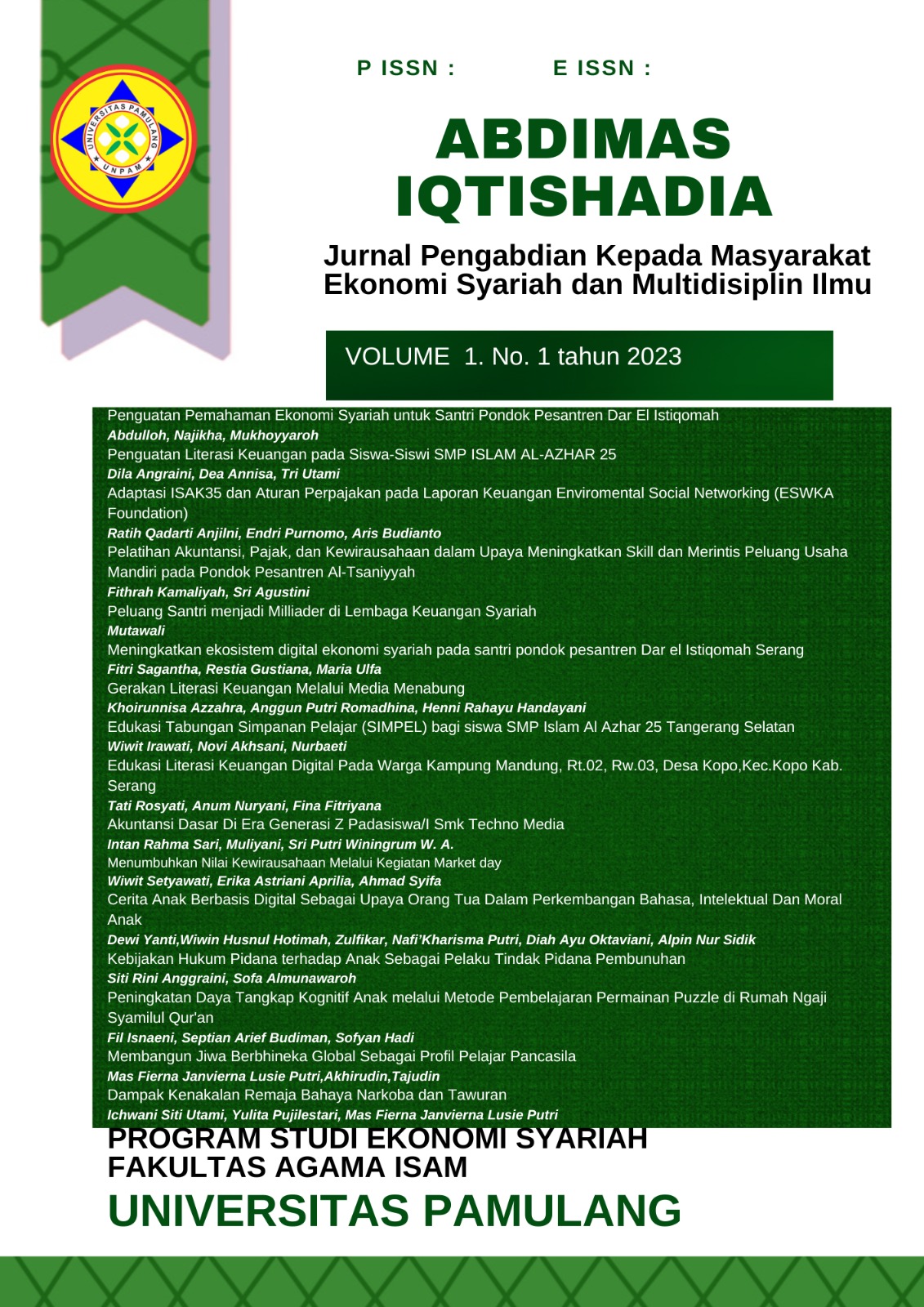Cerita Anak berbasis Digital sebagai Upaya Orang Tua dalam Perkembangan Bahasa, Intelektual dan Moral Anak
DOI:
https://doi.org/10.32493/iqtis.v1i1.31720Keywords:
Children's stories, Digital stories, Intellectual and moral, Parents, Language development.Abstract
Various cases of child development are rife in society. Cases of child development such as language, intellect, and morals deserve important attention. The lack of acquisition of language and literacy that is appropriate for their age is one of the inhibiting factors in children's development that has an impact on their language, psychology, and morals. The stuttering of technology and the communication media experienced by parents are also other factors. It was on this case basis that the PKM team conducted counseling entitled "Digital-Based Children's Story Counseling as a Parent's Effort in the Language, Intellectual, and Moral Development of Children at the Al-Hidayah Taklim Assembly". The implementation of counseling is divided into three sessions, namely: (1) the provision of knowledge about the types of folklore that exist in digital media; (2) the provision of knowledge regarding the five stages of child development and the selection of readings to develop language, intellectual, and moral education in children; and (3) the provision of knowledge of the steps as parents support the development of child psychology through digital reading media. Through this counseling, it was concluded that many parents were still wrong in parenting children in the developmental aspects of language acquisition and child psychology, but the material presented was positively received. Based on the PKM that has been implemented, parents can start a parenting style for their children's language and psychological development according to the material presented.
References
Alen, Harris Randy. (2021). The Linguistics Wars: Chomsky, Lokaff, and The Bettel Over. UK: Oxford University Press.
Ardiati, R. K. (2018). Peran orang tua dalam perkembangan kepribadian anak usia dini. SCHOULID: Indonesian Journal of School Counseling, 3(3), 73–79.
Backer, Misha and Deen, Kamil Ud. (2020) Language Acquisition and Development:Generative Introduction. London: The MIT press. Conley, J. M., O'Barr, W. M., & Riner, R.
C. (2019). Just words: Law, language, and power. University of Chicago Press.
Erika, Nasya Isnaniah, dkk. (2022). Peran Orang Tua Dalam Perkembangan Tumbuh Kembang Anak Usia 3-6 Tahun Di Tk IT Alfia Nur Deli Tua Tahun Ajaran 2021/2022. Jurnal Pendidikan dan Konseling vol 4 no 3. http://journal.universitaspahlawan.ac.i d/index.php/jpdk/article/view/5081
Hamuni, dkk. (2022) Perkembangan Peserta Didik. Eureka Media: Perbalingga.
Nurgiantoro, B. (2018). Sastra anak: pengantar pemahaman dunia anak. Ugm Press.
Rosenberg, Sheldon & Leonard Abbeduto. (2013). Language and Communication in Mental Retardation (Development, Processes, and Intervention). London: Taylor and Francis.
Shengfu fan, Ying Zhang, Jiangbo Qin, et.al. (2020). Family environmental risk factors for developmental speech delay in children in Northern China. International Jurnal of Scientifific Repost.
https://www.nature.com/articles/s41598-021-83554-w#:~:text=In%20conclusion%2C%20 older%20maternal%20age,in%20child ren%20in%20North%20China
Sistiana, D. (2018). Sastra Anak dalam Pembentukan Pendidikan Karakter.Seminar Nasional Pendidikan Bahasa Indonesia, 2(1).
Sit, M. (2017). Psikologi perkembangan anak usia dini edisi pertama. Kencana. Susilo. (2021). Psycholinguistics for Students of Language Education.
Surabaya: Airlangga University Press. Wibisono, Hendra, dkk. (2023) Pengantar Teknologi Pendidikan. Pradina
Pustaka: Sukoharjo.
Talango, S. R. (2020). Konsep perkembangan anak usia dini. Early Childhood Islamic Education Journal, 1(1), 93–107.
Downloads
Published
Issue
Section
License
Copyright (c) 2023 Dewi Yanti, Wiwin Husnul Hotimah, Zulfikar Zulfikar, Nafi’ Kharisma Putri, Diah Ayu Oktaviani, Alpin Nur Sidik

This work is licensed under a Creative Commons Attribution 4.0 International License.




